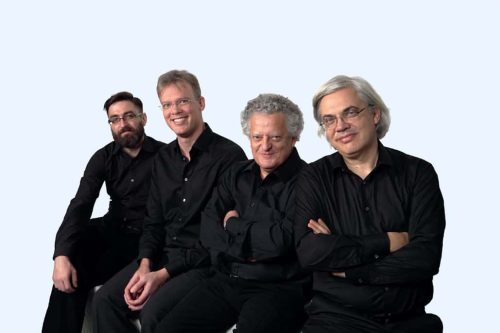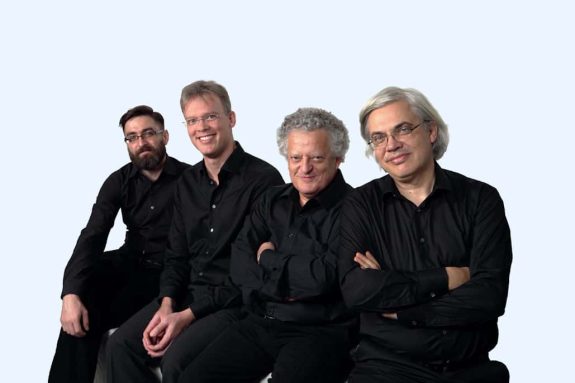 Germany Harvey, Milliken, Hosokawa, and Birtwistle: Arditti Quartet (Irvine Arditti, Ashot Sarkissjan [violins], Ralf Ehlers [viola], Lucas Fels [cello]), Tomoki Kitamura (piano). Pierre Boulez Saal, Berlin, 7.3.2024. (MB)
Germany Harvey, Milliken, Hosokawa, and Birtwistle: Arditti Quartet (Irvine Arditti, Ashot Sarkissjan [violins], Ralf Ehlers [viola], Lucas Fels [cello]), Tomoki Kitamura (piano). Pierre Boulez Saal, Berlin, 7.3.2024. (MB)

Jonathan Harvey – String Quartet no.1 (1977)X
Cathy Milliken – In Speak for string quartet (2023, world premiere)X
Toshio Hosokawa – Oreksis for piano quintet (2023, world premiere)X
Birtwistle – String Quartet: The Tree of Strings (2007)
On 7 March 1974, the Arditti Quartet gave its first concert at the Royal Academy of Music, music to honour Krzysztof Penderecki on bestowal of an honorary degree. Fifty years later to the day and several changes of personnel later – Irvine Arditti the one constant – the Quartet celebrated at Berlin’s Pierre Boulez Saal its fiftieth birthday, followed by a reception hosted by the Paul Sacher Stiftung, which also hosts the ensemble’s archive. True to its spirit, here was a mixture of new and newer: two Arditti commissions, Jonathan Harvey’s First String Quartet (the first ever) and Harrison Birtwistle’s The Tree of Strings sandwiching two new commissions from Cathy Milliken and Toshio Hosokawa.
We do not hear enough of Jonathan Harvey’s music. If that was the case before his death in 2012, it is all the more so now. Reminders such as this can do no harm at all. In a single movement, which, to my ears at least, might possibly have been subdivided into three sections of unequal length, it opened with violin (then viola, then cello) harmonics, melting yet also, like snowflakes, flurrying, becoming stronger: something both fragile and yet primal, the latter especially in the unison melody that emerged and seemed to rule over the quartet as a whole. It felt like embarking on a magical adventure for composer and performers, the latter tracing and projecting the piece’s expressive contours with typical expertise, as the repertoire piece it must be for them, though without a hint of the routine. Sparks flew later, what in the work of another composer we might characterise here as éclat, but here suggesting something deeper, more fundamental, perhaps even Germanic, acknowledging the composer’s crucial encounter with Stockhausen. Material that emerged from the debris developed in any number of other ways, prior to a third section (?) in which a ghost in the machine, a machine in the ghost, or perhaps both propelled the music on its way. Unifying yet further developing, like the ‘tradition’ to which it perhaps still laid claim, the music yet had no ‘return’ in a sign-off of deft brevity.
Cathy Milliken’s In Speak immediately sounded, perhaps to state the all-too-obvious, as if arising from different cultural concerns, a proper contrast in programming as well as composition. Almost dance-like at times, with unmistakeable ‘human’ interjections of speech, ghostly whistling, and so on, it seemed to take in a more ‘connected’ world (not that there was anything remotely insular about Harvey) and some sort of dramatic-conceptual stimulus arising therefrom, without that being ‘the point’. There was even, I thought, a hint of celebration. ‘Tradition’, if it still exists at all, has moved on considerably in half a century, not least thanks to the Arditti Quartet. ‘I hear different notes emerging’, ‘punchline’, ‘I dragged’, ‘until he was pushed’, ‘finding the right word’, a concatenation of verbal phrases enabled strings to take over again, in turn inaugurating a slower moving, constantly shifting section. Further musical scampering, almost suggesting a ‘classical’ return of material in ternary form – suggesting, not straightforwardly representing – brought the piece to its conclusion.
The players were joined by pianist Tomoki Kitamura for Toshio Hosokawa’s Oreksis for piano quintet. Again, this was a very different musical world: not only the soundworld, but procedures, preoccupations, everything. Post-‘impressionist’? Perhaps. Post-Debussy? Somewhat stronger perhaps. But it was not only, or principally, post-anything, however helpful such thoughts may be to gain our initial bearings. Centres of gravity proved very different, lines emerging from them, whilst those centres remained obstinately, strangely alluring. The pianist was not a ‘soloist’, yet had a somewhat different role, seemingly growing from the piano’s different instrumental qualities. (That may sound obvious, but it is far from always the case.) Dreamlike in apparent creation of chords, it built slowly to climaxes that seemed always to be pushed a little further into something beyond. Sliding, slithering lines later seemed liberated from whatever it was that had kept them grounded: new ‘air of another planet’ perhaps? There both are, and are not, new things under our sun(s). Music floated with strange precision, upwards once again, into…
For the final work on the programme, following the interval, we turned to Birtwistle’s 2007 String Quartet: The Tree of Strings. If one might have found a point of comparison with Harvey’s piece in a ‘frozen’ opening, what struck more forcefully again was the difference from all that had been heard before. There was certainly no question who the composer was — nor how great our loss continues to be. These were not so much musical fractals, as some might musically imagine trees, but rather this sounded as music born of an ancient, far from consoling, ‘then’ as seen, or heard, from ‘now’. Melody, harmony, even gesture were as immediate as in stage works such as Gawain or The Minotaur; there was a similarly keen sense of narrative(s) too, without moving into the realm of representation. Even when occasionally more frenetic, it retained a sense of spareness, of everything counting. A not un-Stravinskian candle continued to burn, even to dance, to rock; yet there was a deeper melancholy that seemed to speak of and from remembered or invented landscapes of a Britain beyond its modern towns and cities (not anti-metropolitan, but rather non-metropolitan) as well as memories of Dowland. (How the composer must have hated the snake-oil-salesmen of ‘Brexit’. How wonderful it would have been to see him give Nigel Farage a piece of his mind, not that Farage would have known what to do with it.)
Strength persisted, intensified, through techniques seeming to cross the centuries without ever truly being ‘of’ them. Was that a mediaevalism there? If so, it was hardly the point. Compelled, so it seemed, by the music’s inherent drama, the players, one by one, moved from centre stage to new stations around the hall, the spatial quality of the musical landscape confirmed and extended. It was no gimmick, as it might have been for many – was there a less gimmicky composer than Birtwistle? – but rather born of an expressive need. Was there a centre anymore? That may be the question of musical, and not only musical, modernity, or at least a question. Does it matter? Others left the hall, Lucas Fels’s cello persisting with gruff integrity that came close to overwhelming. It, or rather this, did matter.
Mark Berry
